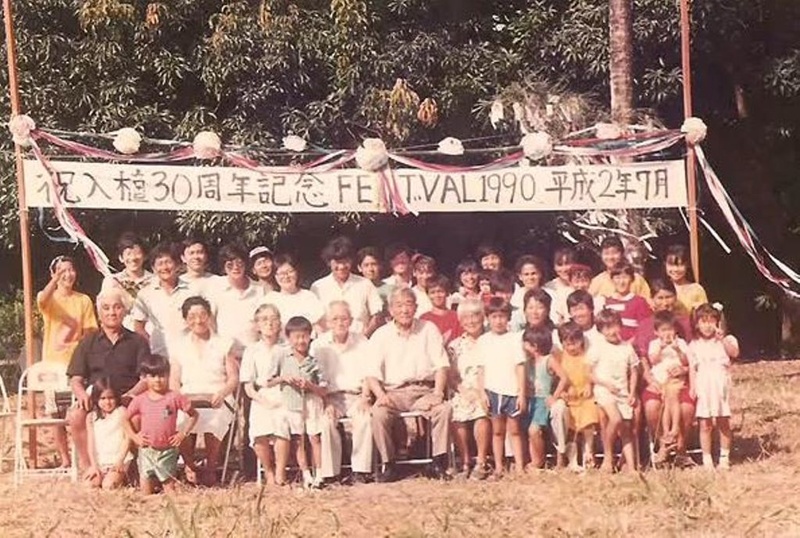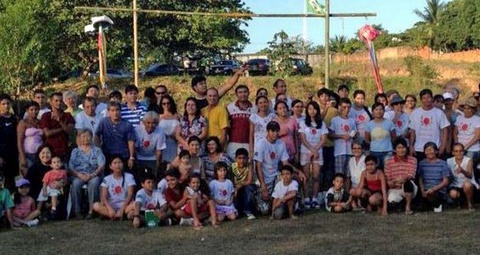Japanese immigration reached almost the entire Brazilian territory, much of it due to the demand for land for the cultivation of horticultural crops in general. Consequently spreading its culture intertwining with the customs and traditions that Brazil has. All this at the cost of much suffering, due to the adaptation to the Brazilian style, which was a problematic and traumatic experience for the Japanese.
Japanese immigrants saw a new chance to change their lives after the problems of World War II. Much of this is due to the opportunity that the Japanese have obtained in Brazilian territory, fleeing from a reality where hunger and misery were constant presence in their lives and daily life. This cultural clash between Japanese and Brazilians has resulted in a number of consequences such as changes in eating habits, cultivation, agricultural techniques, and so on. All the experiences lived by these people are very rich memories where you find stories and stories of people who came from the other side of the world in search of something better. Le Goff (1990) emphasizes that memory, by keeping certain data, helps the past not to be completely forgotten, since it ends up enabling man to update past impressions or information, making history perpetuate itself in human consciousness.
Maranhão was another of the innumerable places that the Japanese made their presence, establishing themselves and constituting a legacy based on many trials and difficulties in a strange territory. The immigrant always suffers when he arrives to live in a new place. Consequently, the immigrant has to make use of the new space to feel more at ease. So they cling to the cultural issue. That is, the immigrant repeats his traditional customs in the new space. Example: The cuisine, popular parties like the Undokai, etc. A people left from a country devastated by the war ended up taking root in Maranhão soil, a place that in no way resembled the Japanese traditions. The state of Maranhão has a great historicity regarding Japanese immigration, a history rich in details, knowledge and facts that until now are little explored.
The memory of the Japanese and their descendants is the basis for the construction of the history of Japanese immigration in Maranhão, allowing to analyze the social belonging by these people and making a correlation between the local culture, Castells (2000, p.22-23) states which identity is "the source of meaning and experience of a people. (...) Every identity is built. The main question is how, from what, by whom and for what it happens. "
World War II had several negative consequences for Japan, a country defeated at the time. Not only Hiroshima and Nagasaki were destroyed, but also almost the entire Japanese industrial park. Without being able to feed and offer jobs, the Japanese government at the time decided to encourage the population to migrate to other countries, in order to reduce social pressure and consequently facilitate the process of reconstruction of the country. That is, a new immigrant process emerged that was very different from the first one, which took place at the end of the 19th century. This time it was not just peasants without much study who broke out in strange lands, but young scholars, qualified specialists in the agricultural area and also in some sectors of industry.
This process of immigration of Japanese families lasted for many years. The state of Maranhão was one of the last destinations of Japanese immigrants in Brazil (SIQUEIRA JUNIOR, 2014, p.28). The arrival of the Japanese in the lands of Maranhão is dated July 10, 1960 (AZEVEDO, 2009). At that time two groups of Japanese immigrants arrived within a period of less than a year, the first group had settled in the Maranhão city of Rosario, while the second group that arrived on January 4, 1961 had settled in the town of Pedrinhas (SIQUEIRA JUNIOR, 2014).
The Japanese families came to Maranhão aiming to practice agriculture, having support from the state government of the time. But the public power did not know how to set the conditions for foreigners to settle without many setbacks, which led to various problems of adaptation by the Japanese. In this way, they had as an alternative the attachment to the legacy of the culture to support the conviviality in a strange place beyond the cultural shock that the Japanese families passed. Adapting the new space occupied under the filter of the Japanese millenarian traditions, mixing with the local culture, was the strategy found to achieve a result that provided the best interaction between the parties, that is, between "strangers" to the locality, with their “peculiar” customs and the people who already lived in the region.
Over the years, from their arrival to contemporary times, living together, customs, everyday life with Maranhão was a very difficult and difficult situation to bear, due to the many issues that diverged between them, such as language, which made communication difficult, as well as other factors, such as lack of water and unfinished housing, which affected even the psychological state of the Japanese (SIQUEIRA JUNIOR, 2014). The feeling of loneliness and isolation ended up influencing the immigrant's depression, because due to their losses, the linkage with their roots ends up being suppressed. Japanese immigrants in Maranhão dealt with a major social impact on their arrival, taking into account the difference in language, climate, habits, food, values, beliefs, and clothing. This brought about a rupture in the way of being and to exist, creating great changes that the Japanese had to face at the time.
Problems arising from mental health are common among immigrants, as these people are more conducive to psychological pressures arising from the difficulties of adapting to the new place. This type of situation can lead to culture shock, which occurs as a result of a new circumstance in which habitual archetypes of behavior cease to be effective and the person does not master codes of social interaction (Fonseca et al., 2005). In the midst of this entire whirlwind of events and to preserve the native culture, the Japanese in Maranhão founded a Japanese-Brazilian association that played a vital role in the maintenance of Japanese unity.
The spare moments of the Japanese immigrants and their descendants from the heavy labor in agriculture and poultry were destined to the practice of cultural activities focusing on the maintenance of the customs. They had a thought that without such a structure, future generations over time would lose the native ties that their parents and grandparents possessed, various habits would be diluted by the rival customs of the West, a concern they continue to have. That is, there is fear of this identity being lost to the Brazilian culture.
The social belonging of the Japanese in Maranhão soil was a factor to be established since their arrival, because they were in a strange land with a different culture and over time were depositing in that space their share of contribution in terms of transforming space as close as possible to their homeland, changing the status of space for territory, a place characterized by the impregnation of power, that is, an environment that they would be sure of themselves, which would be as close as possible to the Japanese territory that they would already be accustomed.
The basis of the entire historical narrative of the Japanese who immigrated to Maranhão is memory. So many experiences and life stories that the descendants and the few Japanese who still live there today have demonstrated how important the knowledge they possess is. The memory they maintain is the result of all this historical process that occurred in Maranhão in the last 55 years. It is a rich source of knowledge where what is possible is passed on to the younger ones.
As far as religiosity is concerned, the Japanese who immigrated to Brazil in a certain way had to convert to the local religion, consequently changing their identity, which Hall (2003, p. 17) understands as "the frames of reference that give individuals a stable anchorage in the social world". All this with the purpose of inserting itself in the local community and awakening a sense of belonging, which would later lead to some socioeconomic gain.
The Japanese in Maranhão have gone from negative and positive over the years, difficulties in the field work, the language issue, the logistics of Japan's trip to Brazil, and even basic issues such as water supply. In addition, achieving the dreamed economic and social rise in Maranhão, a goal stipulated by the Japanese since leaving Japan, representing a great achievement after going through so many obstacles.
Japanese immigrants went through a lot of difficulties on Maranhão soil, many of these problems were derived from questions related to adaptation, with the customs and rites, typical of the Japanese culture. Many of these setbacks were consequences of agreements not being fulfilled by the Maranhão government of the time, such as housing and drinking water. But after some time the Japanese were adapting to reality and with the help of the maintenance of their traditions through the realization of festivities and customs, gradually they began to improve financially speaking and to obtain a better condition of life, being able to balance the financial question with the conservation of their own culture.
BIBLIOGRAPHIC REFERENCES
AZEVEDO, Patrícia Liana Mondêgo de. Imigração japonesa comemora 50 anos no Maranhão. Canal.com, São Luís, v. 1, n. 1, p. 16, janeiro/junho. 2009.
CASTELLS, Manuel. O Poder da Identidade. São Paulo: Paz e Terra, 2000.
Fonseca, L. et al. (2005). (coord.), Reunificação familiar e imigração em Portugal, p.74, p. 194, Coleção “Estudos e Documentos do Observatório da Imigração” n° 15. http://www.oi.acidi.gov.pt/docs/Estudos%20OI/Estudo_OI_15.pdf Acesso em 10 de abril de 2015.
HALL, Stuart. A identidade cultural na pós-modernidade. 8ª ed. Rio de Janeiro: DP&A, 2003
LE GOFF, Jacques. História e memória. Campinas: Unicamp, 1990.
SIQUEIRA JUNIOR, Etevaldo Alves de. O processo de reterritorialização: imigração japonesa no Maranhão. Orientador: Prof. Dr. Juarez Soares Diniz. São Luís: UFMA, 2014. Monografia (Graduação Bacharel em Geografia) – Universidade Federal do Maranhão, São Luís, 2014, 63 f.
*This article is an adaptation of the article with the same title, originally published in Magazine Querubim (Federal Fluminense University - UFF).
© 2016 Etevaldo Alves de Siqueira Junior




